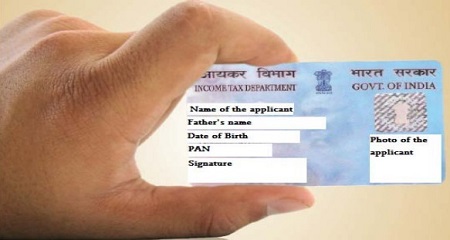Knowingly or unknowingly, we all quote our PAN card number. We never consider or rethink whether quoting our PAN number for particular financial transactions is mandatory or what. However, IT Department made a list of such transactions where quoting PAN is mandatory. Let us see the list of those transactions.

Why quoting PAN number is mandatory?
It makes easy for IT Department to link an individual's all transactions. By doing so, it will be easier of IT Department to track your investments, lending, financial transactions or any business activity.
Below is the list of such transactions where quoting PAN Number is mandatory.
- If the value of immovable property value is more than Rs.5 lakh or more, then whether it is buying or sell, at both the instances you have to quote the PAN number.
- During sale or purchase of motor vehicle (but not for two wheeler buying or selling).
- During the time of time deposit with banking company/post office where the such deposit is more than Rs.50, 000.
- In application where you are applying for telephone connection, including mobile connection.
- When you pay in cash to purchase DD, pay orders or banker's cheques for an amount aggregating to Rs.50,000 or more during a day. Also during deposit in cash aggregating to Rs.50, 000 or more with a banking during any one day.
- During Sale or Purchase contract value of a security is more than Rs.1 lakh.
- During opening of bank account. In case of minor, father, mother or guardian PAN number is mandatory.
- If your hotel bill exceeds Rs.25, 000 at any one time.
- Payment in cash in relation to travel to a foreign country if the amount is exceeded Rs.25, 000. However, travel to foreign countries not included in Bangladesh, Bhutan, Maldives, Nepal, Pakistan or Sri Lanka or Travel to Saudi Arabia for Haj or travel to China on Pilgrimage to Kailash Mansarover.
- During submitting an application for Credit or Debit Card.
- While investing in Mutual Funds if the investable amount is Rs.50,000 or more.
- While buying shares, debentures, or bonds (including Reserve Bank Of India Bonds) of a company if the value is Rs.50, 000 or more.
- While paying an aggregate insurance premium of Rs.50, 000 or more.
- While purchasing bullion or jewellery of Rs.5 lakh or more
- Payment to a dealer of an amount of five lakh rupees or more at any one time.
What if you don't have a PAN number, but entering into above said transactions?
If you don't hold the PAN card, but entering into above said transactions, then you have to submit the Form No. 60 (Form 61 in case of a person having only agricultural income).
Who is responsible if you don't quote the PAN number?
It is the responsibility of a person receiving document relating to the above said financial transactions. For example, in case of Mutual Fund investments, if the value of such investment is Rs.50, 000 or more, then it is the responsibility of Mutual Fund companies to get the correct PAN number of investors and quote the same in the application form.
Top 10 Tax Saving Mutual Funds to invest in India for 2016
Best 10 ELSS Mutual Funds in india for 2016
1. BNP Paribas Long Term Equity Fund
2. Axis Tax Saver Fund
3. Franklin India TaxShield
4. ICICI Prudential Long Term Equity Fund
5. IDFC Tax Advantage (ELSS) Fund
6. Birla Sun Life Tax Relief 96
7. DSP BlackRock Tax Saver Fund
8. Reliance Tax Saver (ELSS) Fund
9. Religare Tax Plan
10. Birla Sun Life Tax Plan
Invest in Best Performing 2016 Tax Saver Mutual Funds Online
For further information contact Prajna Capital on 94 8300 8300 by leaving a missed call
---------------------------------------------
Leave your comment with mail ID and we will answer them
OR
You can write to us at
PrajnaCapital [at] Gmail [dot] Com
OR
Leave a missed Call on 94 8300 8300
-----------------------------------------------